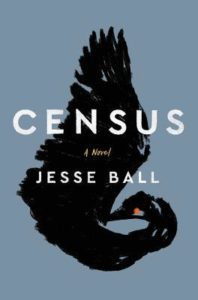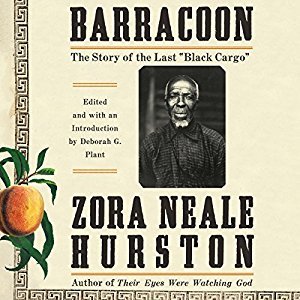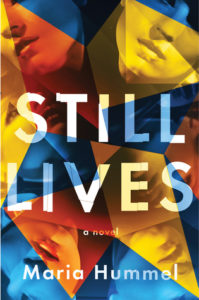Hello dear readers <3
As I mentioned in my previous post, July was a bit of a crazy month for me. My boss hadn’t taken a real vacation where she didn’t check email or wasn’t available by phone for something like twenty years. And then in July she went to Europe for three weeks. It was a well-deserved vacation for her but it meant I got to experience whatever the exact opposite of a vacation is, all while also finishing up an intense yoga training program. Needless to say, I’m glad July is over. Hello August, Hello Birth-month.
Before the celebrations begin, I suppose I should give July a proper wrap up. I finished seven books in July — Dear Mrs. Bird, Meditation for Fidgety Skeptics, The House of Broken Angels, Census, Charlotte Walsh Likes to Win, Still Lives, and Breakout for a total of 2240 pages. The only audiobook I finished was Barracoon, which clocks in at at an easy-peasy 3 hours and 50 minutes. (I finished another audiobook at the very beginning of August that was mostly listened to in July, but since it missed the July 31 cut off, I guess you’ll just have to wait in suspense for what it was.) My year totals so far are 18,081 pages and 191 hours and 21 minutes. While the stress kept my from writing much, not surprisingly, books remained my refuge and I still managed to get in some good reading, though it skewed lighter than my usual go-to reads. I wouldn’t say I’m a true “mood reader” like Madeleine or Katharine, but I definitely go for books that are easier to read and more escapist when work and life stress are particularly intense.
Census
 Census was one of the Modern Mrs. Darcy Summer Reading Guide Picks. While Anne frequently picks books that are literary (as opposed to just pop-fiction) and full of discussion-fodder, this one is the first one that I can remember thinking might have just been entirely over my head. On its face, Census was the story of a dying widower who takes his son with down syndrome on one last trip through the country. They travel from town to town–in order named A through Z–taking the “census” which involves asking a series of never-revealed questions and then leaving a tattoo on the ribs of the person from whom the census was taken. There’s a vaguely sinister feel to the census-taking and I was left with the sense that it stood for something larger….though I’m not sure for the life of me what it was. The book raises questions around the themes of kindness and how we treat people with disabilities, though Ball never provides the answers as to how we should treat people. He simply shows how we do. I was left with the impression that Census was beautiful and haunting but that there had to be something more to it that I was missing. I still don’t know what it was.
Census was one of the Modern Mrs. Darcy Summer Reading Guide Picks. While Anne frequently picks books that are literary (as opposed to just pop-fiction) and full of discussion-fodder, this one is the first one that I can remember thinking might have just been entirely over my head. On its face, Census was the story of a dying widower who takes his son with down syndrome on one last trip through the country. They travel from town to town–in order named A through Z–taking the “census” which involves asking a series of never-revealed questions and then leaving a tattoo on the ribs of the person from whom the census was taken. There’s a vaguely sinister feel to the census-taking and I was left with the sense that it stood for something larger….though I’m not sure for the life of me what it was. The book raises questions around the themes of kindness and how we treat people with disabilities, though Ball never provides the answers as to how we should treat people. He simply shows how we do. I was left with the impression that Census was beautiful and haunting but that there had to be something more to it that I was missing. I still don’t know what it was.
(I found this review in the New York Times to be helpful in discussion Census as well.)
Barracoon
 Barracoon, originally written by Zora Neale Hurston but with added introductory information, is one of those books that I think is a must-read (or listen). While still a fairly young writer, Hurston met Cudjo Lewis, the last living slave brought from Africa and transcribed his recollections of life in what is now Benin, the Middle Passage, and slavery in America before the outbreak of war. As I noted above, this is short–it’s under four hours when performed, including all of the introductory material. It was a tad hard to follow simply because this is the kind of book that has words that aren’t common to English and because Hurston transcribed Mr. Lewis’s accent and vernacular phonetically, though it didn’t take long for me to settle in to the language, so don’t let that turn you off. Given the dearth of available primary sources from Africans and African Americans during this time period (relative to the histories written by white men), this is a book that should be on every reading list and in everyone’s hands.
Barracoon, originally written by Zora Neale Hurston but with added introductory information, is one of those books that I think is a must-read (or listen). While still a fairly young writer, Hurston met Cudjo Lewis, the last living slave brought from Africa and transcribed his recollections of life in what is now Benin, the Middle Passage, and slavery in America before the outbreak of war. As I noted above, this is short–it’s under four hours when performed, including all of the introductory material. It was a tad hard to follow simply because this is the kind of book that has words that aren’t common to English and because Hurston transcribed Mr. Lewis’s accent and vernacular phonetically, though it didn’t take long for me to settle in to the language, so don’t let that turn you off. Given the dearth of available primary sources from Africans and African Americans during this time period (relative to the histories written by white men), this is a book that should be on every reading list and in everyone’s hands.
Still Lives
 Quite literally the day after I posted a mini-review of Still Lives on Instagram, Reese Witherspoon picked it for her August book club pick. I guess Reese and I have slightly different taste. I’ve said it before but thrillers, unless they raise questions like those in The Blinds, aren’t really my thing. I pick them up when I’m in a rut because they’re easy and fast but I never love them or feel it necessary to own my own copy once I’m done. I was having trouble picking a book and needed something that didn’t make me think, since work was requiring all my extraneous brain cells–so Still Lives happened.
Quite literally the day after I posted a mini-review of Still Lives on Instagram, Reese Witherspoon picked it for her August book club pick. I guess Reese and I have slightly different taste. I’ve said it before but thrillers, unless they raise questions like those in The Blinds, aren’t really my thing. I pick them up when I’m in a rut because they’re easy and fast but I never love them or feel it necessary to own my own copy once I’m done. I was having trouble picking a book and needed something that didn’t make me think, since work was requiring all my extraneous brain cells–so Still Lives happened.
Artist Kim Lord goes missing on the night of the opening of her show, “Still Lives,” an exploration of the glorification and commodification of female murder victims–their bodies are taken by their killers and yet the violations continue as we repeatedly gaze at and speculate about their murders. Lord dresses up as each of the victims in their infamous death scenes or poses, photographs it, then paints from the photographs. The result is pictures that look like the victims until you look closely and can see that each victim could be someone else (in this instance, Lord). Maggie, ex-girlfriend to Lord’s boyfriend and employee of the museum hosting the exhibition, finds herself pulled into the investigation. At the end of the day, the whodonit was fine and Maggie was relatable protagonist, but the most interesting part of the book to me was simply the message being sent by the fake Kim Lord with her fictional paintings. If you like mysteries and the premise sounds interesting to you, this might be worth your time. It just wasn’t my thing.
I’m still deciding on some August reads–are you reading anything good? I’d love to hear about it in the comments. <3
Header Photo Credit Stephanie McCabe



 Synopsis
Synopsis